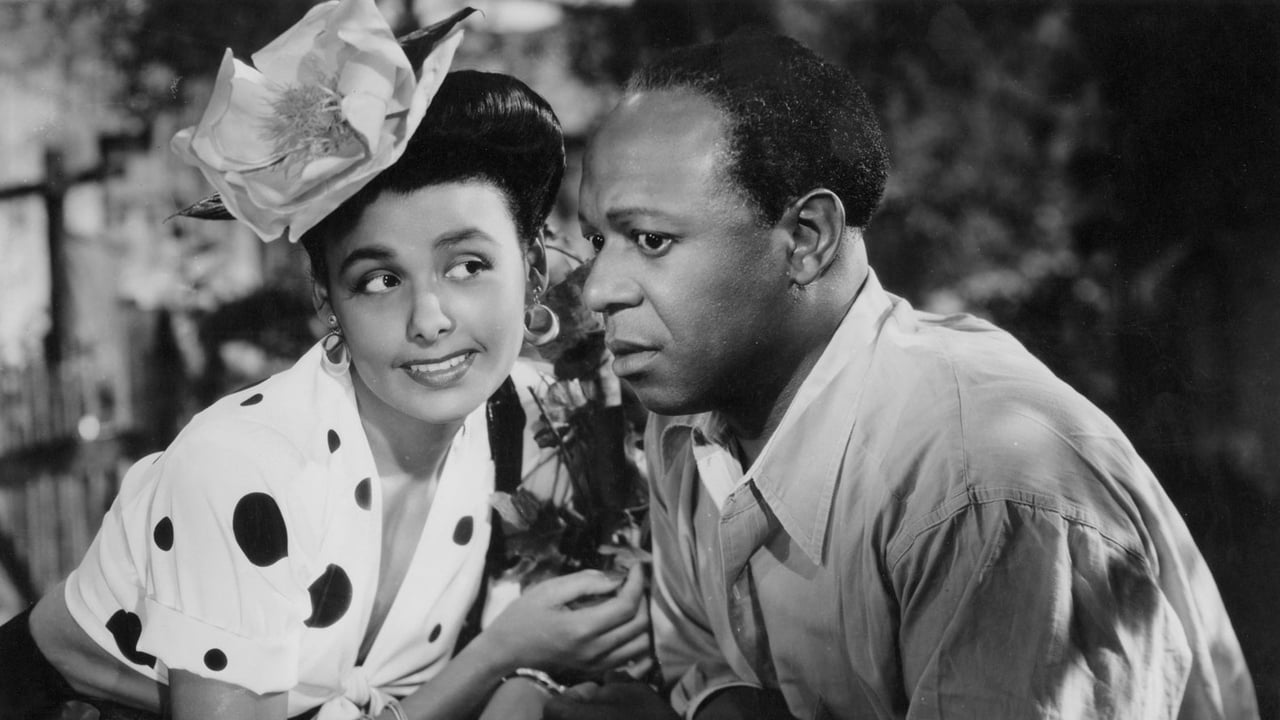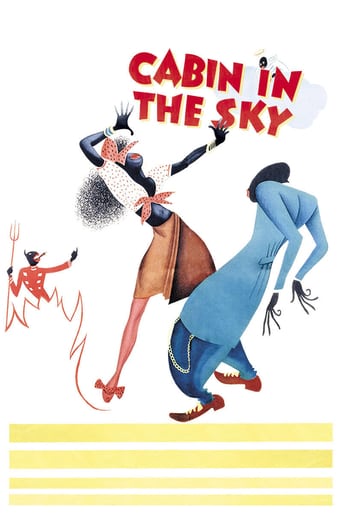

Really Surprised!
... View MoreDisturbing yet enthralling
... View Moredisgusting, overrated, pointless
... View MoreIn truth, there is barely enough story here to make a film.
... View MoreEven though this movie was done in the 40's I found it to be really bad. Although I enjoyed the singing, dancing, and parts of the acting it was still a cheesy and somewhat offensive movie. It is so far off from the actual gospel, and it seems to make a joke out of everything to do with spirituality. If You are going to make a Christian movie that is supposed to teach a lesson, at least make it serious, and don't act idiotic miss information to it. The scenery and the graphics were awful, but this was the 40's so I won't really speak about that. Other than these issues a major problem I had was the poorly thought out scripting. The story could have been much better, and a lot more complex, they could have fixed this even with the low budget the producers probably had. The talented cast was wasted, and by the end of the film I wished I had never turned it on in the first place. It may be a "classic" to some people but I fail to see why, You may enjoy it if You like old musicals with a bunch of foolishness in it, but this is not my taste.
... View MoreA compulsive gambler (Eddie Anderson) dies during a shooting, but he will receive a second chance to reform himself and to make up with his worried wife (Ethel Waters).What I find odd about this is that MGM's DVD has a warning before it starts that what you see might be considered racist today. This might be the case. However, having seen countless films from the 1930s and 1940s with black actors, I can confidently say this is far from the worst depiction you will see. In fact, the film has an all-black cast, which has to be something of a milestone in itself regardless of how it is interpreted.There is nothing too shocking in the picture as far as the plot is concerned. You can reasonably predict where it will go. But there is the now timeless theme of a good angel and a bad angel fighting over a man's soul... and their battles might be of interest. I liked it.
... View MoreCabin in the Sky (1943)*** (out of 4) Landmark MGM Musical has sinner 'Little Joe' Jackson (Eddie 'Rochester Anderson) getting killed inside a gambling house but his wife Petunia (Ethel Waters) says a prayer, which causes a fuss in Heaven. Lucifer, Jr. (Rex Ingram) wants to take Jackson to Hell but the good guys are able to make a deal where he gets six more months on Earth to prove himself good. Jackson starts off well but soon Lucifer puts Georgia Brown (Lena Horne) on the case. This all-black cast Musical has one of the better reputations out there for a race picture and it's certainly one of the best. There's no question that MGM took a fairly simple story and filled it with some great performances, nice songs, wonderful direction and in the end we're left with a pretty important picture. Considering one scene in this movie cost more than ten other race movies of this era, it's refreshing to see what a black cast could do when given the chance. Considering how well this film turned out, it's a shame more movies like this didn't follow but what we have here is still quite special. For me the highlights of this film are the performances with the three leads fitting into their roles so well that you really forget that you're watching a movie. The spiritual and fiery nature of Waters makes for a brilliant performance as she really digs into this role and makes it her own. She's funny, sweet and very touching in her scenes of prayer and one can't help but feel as if she really is the perfect wife the screenplay makes her out to be. Anderson and that wonderful voice is perfect for that not-so-bright character who tries well but often finds himself in even more trouble. Ingram is a lot of fun as Lucifer, Jr. and Kenneth Spencer and his wonderful voice is a pleasure as well. We even get Louis Armstong, Willie Best, Mantan Moreland and Leon James Poke doing fine work. Just look at the type of performances Moreland and Best get to give here in comparison to the typical roles and performance they had to give in other Hollywood productions. With all of that said, it's Horne who steals the show as the devil-ish Peach. I know a scene involving Horne in a bath (later to appear in the short STUDIO VISIT) was cut but I was still surprised to see how sexual the production code allowed here. From her taking her shirt off to her sexual walks to her shirt being tied up. The sexual fire Horne brings to the role makes her beauty really jump off the screen but we also get that great voice. The story itself isn't the strongest but I think it does the job as we care for Anderson enough to the point that we want to see him stay out of trouble and make it to Heaven. The songs are all pretty good, the direction top-notch and in the end we're given a rare chance to see what black actors could do when given a shot. It's a shame we didn't get more productions like this one.
... View MoreLet's call it a deserved "10" but with a sense of trouble for one's conscience.In 1943 it was nearly impossible to consider any film with a predominantly African-American cast as serious by most Americans of Caucasian or non-African-American backgrounds. Typical fare from Hollywood was a series of stereotypes, usually for comic purposes. However there had been a few films that (even with the stereotypes) suggested more was there. King Vidor's HALLELUJAH in 1929 dealt with African-American revivalism. Two Broadway hits, O'Neill's THE EMPEROR JONES (with star Paul Robeson recreating the role of Brutus Jones) and THE GREEN PASTURES had been done with mostly African-American casts (Dudley Digges did play a critically important role in THE EMPEROR JONES, but he was an exception). The 1929 and 1936 versions of SHOW BOAT did deal with the "Jim Crow" south, and the issue of racially mixed marriages. The film of Fanny Hurst's novel IMITATION OF LIFE (1933) dealt with a young woman trying to pass for white and breaking her mother's heart as a result. GONE WITH THE WIND passed on the myths of how happy the slaves were in the South, but Hattie McDaniel's performance of "Mammy" was vivid and strong, and won the first Oscar for an African-American performer. Finally, in 1942, John Huston's film, IN THIS OUR LIFE, dared to suggest that a young African-American man could try to study law to enter the legal profession.When Vincent Minelli was assigned to do the MGM musical version of CABIN IN THE SKY, most insiders thought that it would be a flop. Minelli had never directed a film before, and was an unknown quantity in Hollywood's talent market. Actually he was a good choice - he was a veteran of Broadway musical productions, and was just the right person to work on a film based on a Broadway musical. It was his first film, and proved to be a great success.It think it is due in part to his determination to show what he could bring out of the musical, and also the equal determination of the cast, led by Ethel Waters (who played the lead "Petunia" on Broadway), Eddie Anderson ("Joe"), Lena Horne (as temptress "Georgia Brown"), John Bubbles ("Domino Johnson"), Kenneth Spencer ("The General/ Rev. Greene"), and Rex Ingram ("Lucifer Jr."). Other familiar faces crop up like Willie Best, Mantan Morland, Oscar Polk, Butterfly McQueen, Louis Armstrong (oddly wasted in a mostly comic speaking role), and Duke Ellington and his orchestra. It's hard to imagine this but this film effort had the cream of Hollywood's available African-American performers in it. And they wanted to show what they could do.The story is about the devotion of Petunia to her husband Little Joe, who is weak and constantly gambling. But he hopes to win a fortune to give Petunia the things she always wanted. Unfortunately he is also infatuated with Georgia, a sexy singer at the gambling house/night club he heads for. One night (while supposedly seeking forgiveness for his sins at church) Joe is lured to the nightclub into a dice game, and is shot by Domino. He is treated at home and the film goes from this point to it's conclusion with a battle between God's messenger, "the General" (always wearing white uniforms), and "Lucifer Jr." and his minions. Due to a technicality Joe is not to die, but is given six months more to show his wife's devotion is strong enough to put him permanently on the good and narrow path. Lucifer Jr. and his associates (including Morland, Armstrong, and Best) are determined to show Joe cannot change.The cast shows what they could do. Waters in particular has two songs that became standards: "Happiness is a Guy named Joe", by Harold Arlin and Y.I.P. Harburg, and "Taking a Chance On Love" by Vernon Duke from the original score. But Horne is allowed to sing as well (though one number was cut here but transposed elsewhere). Bubbles does his great dance and song act in the latter part of the film, in the number "Shine". Even Anderson (best recalled for being Jack Benny's foil as "Rochester") demonstrates singing in a duet with Horne, and dance in a number with Waters.I suppose my favorite though is Ingram. He's now the forgotten man in African-American film history, because he never had the degree of public attention that Paul Robeson received. But he appeared in the lead as "De Lawd" in the movie version of THE GREEN PASTURES, as "Lucifer Jr." here, as the genie in the Alexander Korda epic THE THIEF OF BAGHDAD (1941), and graced other films as well (as the gentle valet to Ronald Colman in THE TALK OF THE TOWN, where he starts crying at his boss's insistence at shaving off his distinguished goatee). Ingram, I feel, could play any kind of part. Given the paucity of good lead parts in his day, that he got three of them shows Hollywood and British producers thought well of him. Here he does not sing (I suspect he did not have the voice) but he is enjoying his wickedness throughout. He also has one of the best lines in the film - complaining of the lack of good ideas (in getting Joe's soul): he says that it's because the best idea men in Hell are currently in Europe (this being the fourth year of World War II). The film is actually quite entertaining to this day - although the stereotypes of crap shooting African-Americans is unsettling. But think of this point: this is the first film I know of from Hollywood where a black professional is shown who is not a minister! When Eddie Anderson is treated for his gunshot wound, the physician is black, and is not a stereotype.
... View More